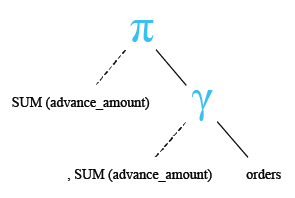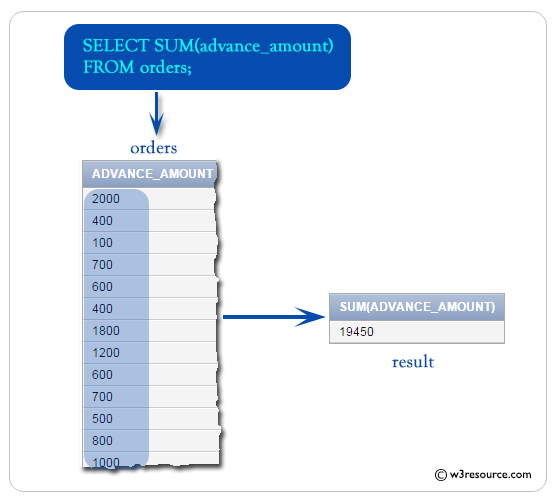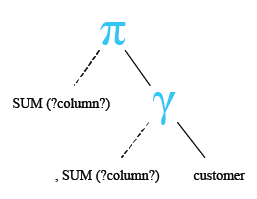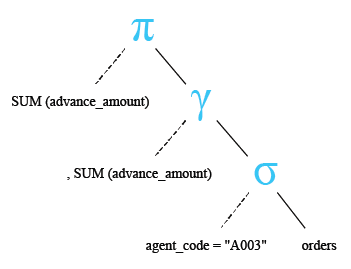SQL SUM() function
SUM() function
The SQL AGGREGATE SUM() function returns the SUM of all selected column.
Syntax:
SUM ([ALL | DISTINCT] expression )
DBMS Support : SUM() function
| DBMS | Command |
| MySQL | Supported |
| PostgreSQL | Supported |
| SQL Server | Supported |
| Oracle | Supported |
DB2 and Oracle Syntax :
SUM ([ALL | DISTINCT] expression ) OVER (window_clause)
Parameters:
| Name | Description |
|---|---|
| ALL | Applies to all values. |
| DISTINCT | Return the SUM of unique values. |
| expression | Expression made up of a single constant, variable, scalar function, or column name. The expression is an expression of the exact numeric or approximate numeric data type category, except for the bit data type. Aggregate functions and subqueries are not permitted. |
Syntax diagram - SUM() function

SQL SUM() on specific column example
To get the total SUM of 'advance_amount' of the 'orders' table, the following SQL statement can be used :
Sample table: orders
SQL Code:
SELECT SUM(advance_amount)
FROM orders;
Relational Algebra Expression:

Relational Algebra Tree:

Output:
SUM(ADVANCE_AMOUNT)
-------------------
19450
Pictorial Presentation:

SQL SUM() using multiple columns example
To get the sum of 'opening_amt' and 'receive_amt' from the 'customer' table, the following SQL statement can be used:
Sample table: customer
SQL Code:
SELECT SUM (opening_amt + receive_amt)
FROM customer;
Relational Algebra Expression:

Relational Algebra Tree:

Output:
SUM(OPENING_AMT+RECEIVE_AMT)
----------------------------
353000
SQL SUM() with where
In the following example, we have discussed usage of WHERE clause along with the SQL SUM() function to sum one or more columns against one or more conditions.
Example:
To get the total SUM of 'advance_amount' of the 'orders' table with the following condition -
1. 'agent_code' must be 'A003',
the following SQL statement can be used :
Sample table: orders
SQL Code:
SELECT SUM (advance_amount)
FROM orders
WHERE agent_code = 'A003';
Relational Algebra Expression:

Relational Algebra Tree:

Output:
SUM(ADVANCE_AMOUNT)
-------------------
1000
SQL SUM() with COUNT()
In the following example, we have discussed the usage of SQL SUM() and SQL COUNT() together in a SQL SELECT statement. Regarding this, it should be mentioned that the SQL SUM() and SQL COUNT() both returns a single row.
Example:
To get data of 'cust_country',SUM of 'opening_amt' for each 'cust_country' and number of 'cust_country' from the 'customer' table with the following condition -
1. data should be a group on 'cust_country',
the following SQL statement can be used :
Sample table: customer
SQL Code:
SELECT cust_country, SUM(opening_amt),
COUNT(cust_country)
FROM customer
GROUP BY cust_country;
Relational Algebra Expression:

Relational Algebra Tree:

Output:
CUST_COUNTRY SUM(OPENING_AMT) COUNT(CUST_COUNTRY) -------------------- ---------------- ------------------- USA 18000 4 India 73000 10 Australia 19000 3 Canada 25000 3 UK 26000 5
Note: Outputs of the said SQL statement shown here is taken by using Oracle Database 10g Express Edition
Here is a slide presentation of all aggregate functions.
Practice SQL Exercises
- SQL Exercises, Practice, Solution
- SQL Retrieve data from tables [33 Exercises]
- SQL Boolean and Relational operators [12 Exercises]
- SQL Wildcard and Special operators [22 Exercises]
- SQL Aggregate Functions [25 Exercises]
- SQL Formatting query output [10 Exercises]
- SQL Quering on Multiple Tables [8 Exercises]
- FILTERING and SORTING on HR Database [38 Exercises]
- SQL JOINS
- SQL SUBQUERIES
- SQL Union[9 Exercises]
- SQL View[16 Exercises]
- SQL User Account Management [16 Exercise]
- Movie Database
- BASIC queries on movie Database [10 Exercises]
- SUBQUERIES on movie Database [16 Exercises]
- JOINS on movie Database [24 Exercises]
- Soccer Database
- Introduction
- BASIC queries on soccer Database [29 Exercises]
- SUBQUERIES on soccer Database [33 Exercises]
- Hospital Database
- Employee Database
- More to come!
Want to improve the above article? Contribute your Notes/Comments/Examples through Disqus.
Previous: COUNT Having and Group by
Next: SUM using GROUP BY
SQL: Tips of the Day
SQL Server SELECT into existing table.
INSERT INTO dbo.TABLETWO SELECT col1, col2 FROM dbo.TABLEONE WHERE col3 LIKE @search_key
This assumes there's only two columns in dbo.TABLETWO - you need to specify the columns otherwise:
INSERT INTO dbo.TABLETWO (col1, col2) SELECT col1, col2 FROM dbo.TABLEONE WHERE col3 LIKE @search_key
Database: SQL Server
Ref: https://bit.ly/3y6tpA3
- New Content published on w3resource:
- HTML-CSS Practical: Exercises, Practice, Solution
- Java Regular Expression: Exercises, Practice, Solution
- Scala Programming Exercises, Practice, Solution
- Python Itertools exercises
- Python Numpy exercises
- Python GeoPy Package exercises
- Python Pandas exercises
- Python nltk exercises
- Python BeautifulSoup exercises
- Form Template
- Composer - PHP Package Manager
- PHPUnit - PHP Testing
- Laravel - PHP Framework
- Angular - JavaScript Framework
- Vue - JavaScript Framework
- Jest - JavaScript Testing Framework
